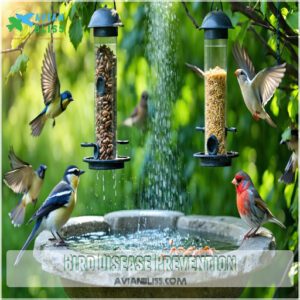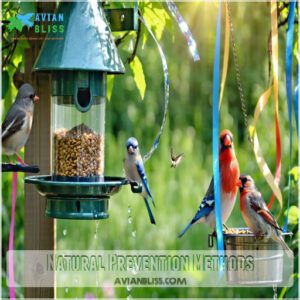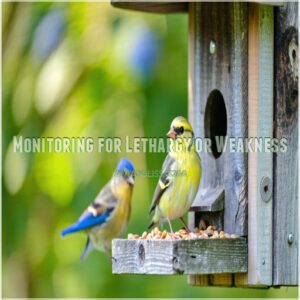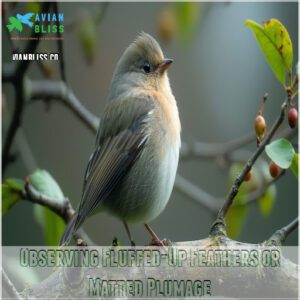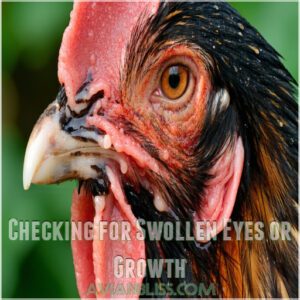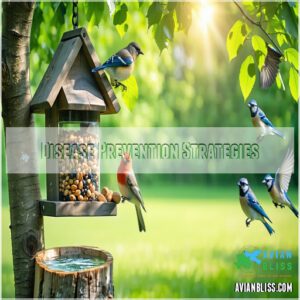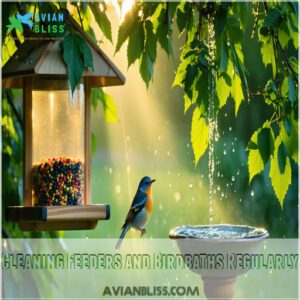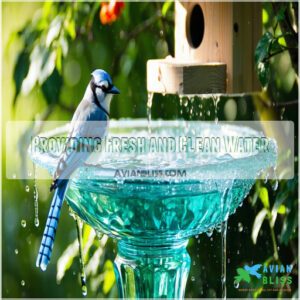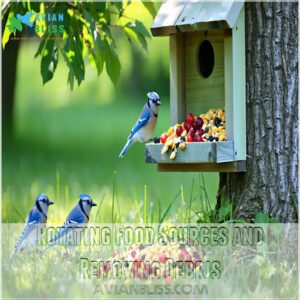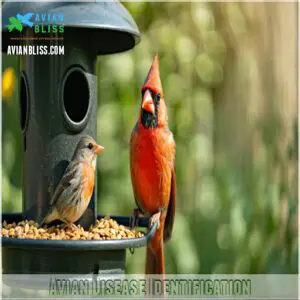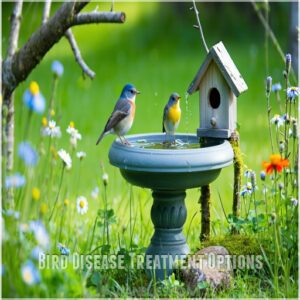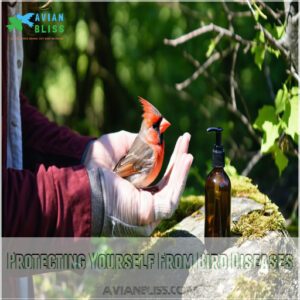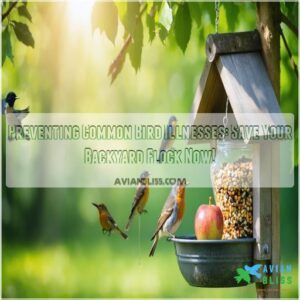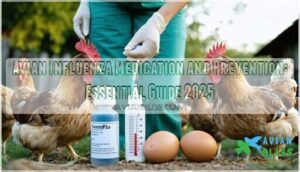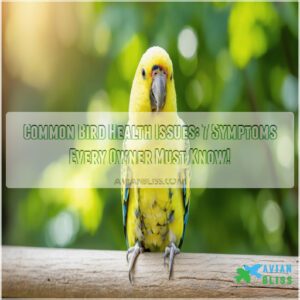This site is supported by our readers. We may earn a commission, at no cost to you, if you purchase through links.
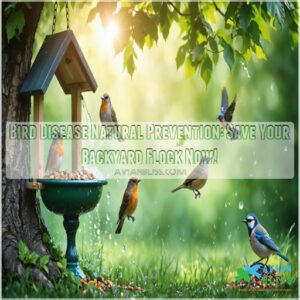
Bird disease natural prevention methods start with smart habitat management. Rotate your feeding sites weekly to reduce pathogen spread, and always use high-quality, dust-free seeds. Keep feeders and birdbaths squeaky clean, and watch for telltale signs of illness like matted feathers, swollen eyes, or unusual lethargy. Reflective materials can deter unwanted visitors, while nutrient-rich seed mixes support overall bird health.
By staying vigilant and creating a clean, well-maintained environment, you’ll help your feathered friends stay healthy and happy.
Want to know more about protecting your backyard flock?
Table Of Contents
- Key Takeaways
- Bird Disease Prevention
- Natural Prevention Methods
- Recognizing Sick Birds
- Disease Prevention Strategies
- Bird Feeding Station Management
- Avian Disease Identification
- Bird Disease Treatment Options
- Protecting Yourself From Bird Diseases
- Frequently Asked Questions (FAQs)
- How to prevent bird diseases?
- How do you prevent bird flu naturally?
- What is the treatment and prevention of bird flu?
- What kills H5N1 on surfaces?
- Can herbs naturally boost bird immune systems?
- Do probiotics help prevent avian diseases?
- What natural predators reduce disease transmission?
- How do environmental factors impact bird health?
- Can specific plant extracts prevent infections?
- Conclusion
Key Takeaways
- You’ll protect your backyard birds by rotating feeding sites weekly, which reduces pathogen spread and prevents disease buildup in concentrated areas.
- Keep your bird feeding stations squeaky clean by disinfecting feeders and birdbaths regularly, using a mild bleach solution and ensuring thorough drying to minimize bacterial growth.
- Watch for telltale signs of illness like unusual lethargy, matted feathers, or swollen eyes, as early detection can prevent disease transmission and help you take swift action to protect your flock.
- Choose high-quality, dust-free seeds and nutrient-rich food mixes that support bird immunity, and strategically place reflective materials to deter unwanted visitors and create a healthier backyard environment.
Bird Disease Prevention
Protecting your backyard birds from diseases requires vigilant and proactive management of their environment and health.
By understanding common avian health risks and implementing strategic prevention techniques, you’ll safeguard your feathered friends and create a thriving, disease-resistant habitat.
Health Risks From Avian Diseases
Avian infections lurk in your backyard, waiting to strike. Bird flu, a notorious respiratory menace, can jump from feathered friends to humans through eyes, nose, and mouth.
Zoonotic risks include psittacosis, salmonellosis, and West Nile virus. Psittacosis is caused by Chlamydia psittaci bacteria.
Airborne droppings carry hidden dangers, transforming your peaceful bird sanctuary into a potential health hazard.
Property Damage and Crop Contamination
After battling respiratory risks, farmers face another feathered foe: crop destruction. Birds like starlings can devour a ton of grapes daily, causing $150 million in annual agricultural damage.
Farmers can employ non-lethal bird control to mitigate these losses.
Smart crop protection involves bird deterrents like reflective tape, netting, and strategic habitat modification to minimize food contamination and property repair challenges.
Bird Noise and Disturbances
The urban symphony of bird noise can quickly transform from a pleasant chirp to a cacophonous nightmare.
Urban roosting and flock behavior contribute to significant sonic disruptions.
Here’s how bird noise impacts your environment:
- Persistent cooing reaches up to 80 decibels, rivaling city traffic sounds.
- Large flocks create chaotic soundscapes in residential and commercial spaces.
- Continuous bird sounds trigger stress and potential hearing fatigue.
Natural Prevention Methods
If you want to shield your feathered friends from diseases, natural prevention is your best defense. Bird sanitation starts with smart habitat modification that discourages disease transmission.
Choose high-quality, dust-free seeds and spread feeders across different locations to prevent overcrowding. Rotate feeding sites weekly, allowing areas to rest and reducing pathogen buildup.
Natural bird disease prevention means creating an environment that boosts bird immunity naturally. Use wildlife-safe, reflective materials like aluminum foil or shiny streamers to deter unwanted visitors while protecting your backyard flock.
Carefully select seed mixes free from fillers, prioritizing nutrient-rich options that support bird health. Keep water sources clean and spread out, using saltwater in fountains to discourage congregating.
These simple steps can dramatically reduce disease risks. By following effective bird flu prevention methods, you can substantially lower the risk of outbreak in your backyard flock.
Recognizing Sick Birds
You’ll need sharp eyes and quick action to spot the warning signs of illness in your backyard birds.
Unusual behavior like weakness or matted feathers can indicate a problem.
Symptoms such as swollen eyes or fluffed-up feathers are clear indicators that immediate attention is required.
Monitoring for Lethargy or Weakness
Like a skilled detective, you’ll need to watch for subtle changes in your birds’ behavior that signal potential health issues.
Regular health checks help catch problems early.
Here are key lethargy signs to monitor:
- Decreased movement and sluggish responses to food or treats
- Birds staying hunched or inactive during peak activity hours
- Reduced interaction with other flock members or reluctance to fly
Observing Fluffed-Up Feathers or Matted Plumage
Spotting fluffed-up feathers or matted plumage can reveal important signs of illness in your backyard birds. Regular feather inspection helps you catch problems early, ensuring better bird disease prevention.
| Warning Signs | Healthy Signs | Action Needed |
|---|---|---|
| Dirty, oily plumage | Clean, sleek feathers | Monitor daily |
| Ruffled, separated feathers | Smooth, aligned feathers | Check for parasites |
| Matted, wet-looking patches | Dry, intact plumage | Consider isolation |
In fowl health management, you’ll notice sick birds often puff up their feathers to stay warm, while avian hygiene issues show through unkempt appearance.
Checking for Swollen Eyes or Growth
Regular inspection of your birds’ eyes acts as an early warning system for potential health issues.
You’ll want to watch carefully for these critical signs of eye infection or growths:
- Reddened, crusty, or swollen areas around the eyes indicating possible fowl pox
- Unusual lumps or bird tumors affecting avian vision
- Cloudy or watery discharge suggesting respiratory problems
- Beak deformities near the eye area
- Asymmetrical facial features that might signal deeper issues
Disease Prevention Strategies
You’ll protect your backyard birds from diseases by maintaining clean feeders, managing feeding sites properly, and providing high-quality food.
Your consistent attention to hygiene and smart feeding practices will create a safe environment where your feathered friends can thrive without the risk of spreading illnesses.
Maintaining Hygiene and Cleanliness
Proper hygiene stands as your first defense against bird diseases.
You’ll need to clean feeders weekly using bird-friendly disinfectants and hot water. Don’t forget to sanitize equipment and disinfect surfaces where birds frequently gather. Weekly cleaning is essential to maintain a safe environment.
Empty and scrub bird baths daily to prevent contaminated water buildup. Daily scrubbing helps ensure fresh water for birds. Remove waste promptly, as droppings can spread diseases quickly.
A clean feeding station is a healthy feeding station. Effective disease prevention relies on using safe cleaning products to minimize risks. Safe cleaning products are crucial for protecting both birds and their environment.
Feeding Site Management and Food Quality
Now that your cleaning routine is set, let’s focus on smart feeder placement and quality food choices.
You’ll want to spread your feeding sites across your yard to prevent overcrowding, which helps with natural bird disease control.
Store seeds in airtight containers and check for mold before filling feeders. Choose high-quality mixes without fillers, and maintain consistent feeding schedules. This supports natural foraging while keeping your backyard birds healthy.
Supporting Bird Welfare Year-Round
Beyond food quality, caring for birds means adapting your seasonal feeding strategy.
In winter, you’ll want to offer high-energy foods like suet and black oil sunflower seeds.
Spring calls for calcium-rich options to support nesting, while summer demands fresh water sources.
Come autumn, focus on nutrient-dense mixes that help birds prepare for migration.
This natural approach to bird nutrition boosts their immunity year-round.
Bird Feeding Station Management
You’ll prevent deadly bird diseases by cleaning your feeding stations weekly with soap and disinfectant, while rotating feeder locations to avoid overcrowding.
Your careful attention to providing fresh, clean water daily and removing uneaten food will create a safe environment where your backyard birds can thrive without spreading infections.
Cleaning Feeders and Birdbaths Regularly
Your bird feeders need weekly deep cleans to protect your feathered friends. Mix one part bleach with nine parts water to create an effective disinfectant for feeder sanitation. Scrub thoroughly, paying special attention to perches and feeding ports where birds gather. Let feeders dry completely before refilling.
A clean feeding station boosts bird immunity and helps prevent the spread of diseases among your backyard visitors. Regular maintenance of bird feeding stations is essential for a healthy backyard flock.
Providing Fresh and Clean Water
Fresh, crystal-clear water is your backyard birds’ lifeline to natural bird health.
You’ll want to change their water daily, removing any debris or algae that could harbor harmful bacteria.
For ideal bird hydration, position water sources away from feeders to prevent seed contamination.
Remember to sanitize birdbaths weekly with a mild bleach solution (1:10 ratio), rinse thoroughly, and refill with clean water for effective bird disease prevention.
Proper bird waterers maintenance involves understanding bird water systems to maintain the health of your backyard flock.
Rotating Food Sources and Removing Debris
Maintaining a rotation of diverse food sources helps prevent disease buildup in your feeding stations.
You’ll want to switch between different quality seeds, nuts, and fruits every few days while promptly removing any scattered debris or wet food.
This food rotation strategy, combined with regular waste management, keeps your backyard birds healthy and reduces the risk of parasites or infections from contaminated feed.
Avian Disease Identification
You’ll need to watch for key signs of illness in your backyard birds, including unusual behaviors like reduced activity, breathing problems, and physical changes such as swollen eyes or ruffled feathers.
Your quick action in identifying these symptoms can prevent diseases from spreading to your entire flock.
So it’s important to check your birds daily for any concerning changes.
Common Backyard Bird Diseases
Your backyard birds face several common diseases that require vigilant monitoring.
Avian pox causes wart-like growths, while bird flu leads to severe respiratory issues. West Nile virus and trichomoniasis affect birds’ breathing and swallowing abilities. Salmonellosis brings lethargy and diarrhea, posing risks to your flock’s health.
Natural bird disease prevention starts with understanding these threats and implementing proper backyard bird health measures.
Recognizing common disease symptoms is paramount for maintaining a healthy flock.
Symptoms and Impact of Avian Diseases
How quickly can an avian disease turn deadly? Bird health hinges on recognizing critical warning signs that might spell disaster for your flock.
Key symptoms include:
- Respiratory distress and unusual breathing patterns
- Dramatic changes in energy and activity levels
- Physical manifestations like ruffled feathers and swollen eyes
Bird mortality rates can skyrocket without early intervention, making vigilant avian disease prevention essential for backyard bird populations.
Reporting Disease Outbreaks and Management
When bird diseases strike, knowing how to report and manage outbreaks can save your flock.
Your quick action matters.
Here’s a guide to managing health alerts effectively:
| Reporting Channel | Contact Information |
|---|---|
| USDA Hotline | 866-536-7593 |
| Emergency Animal Disease | 1800 675 888 |
| Local Animal Control | Regional Contacts |
| State Veterinary Services | Jurisdiction-Specific |
| CDC Bird Flu Tracking | Online Reporting |
Human disease surveillance starts with recognizing and reporting abnormal bird behavior promptly.
Bird Disease Treatment Options
When your backyard birds fall ill, quick and targeted treatment can make all the difference in saving your flock.
You’ll need to understand the right approaches to vaccination, antiviral medicines, and supportive care to help your feathered friends recover and prevent disease spread.
Vaccination and Biosecurity Measures
After spotting signs of illness, your best defense is a robust vaccination strategy combined with strict biosecurity protocols.
Bird immunization stops disease spread like a shield, preventing potential outbreaks. By implementing targeted vaccine development and infection control measures, you’ll protect your flock from devastating avian diseases.
Keep your feathered friends healthy and thriving by understanding respiratory disease treatment.
Antiviral Medicines and Treatment
When symptoms like tremors or neck twisting appear, antiviral medicines offer hope for your feathered friends.
Here’s what you’ll need for effective treatment:
- Start with natural viral inhibitors to boost their immune response before trying stronger medication
- Monitor their reaction to antiviral drugs daily, watching for signs of medication resistance
- Document treatment progress to help prevent future outbreaks in your flock
Remember: early intervention with appropriate medicines gives your birds the best chance of recovery.
Supporting Bird Recovery and Health
While antiviral medicines help, your birds’ recovery depends on strong natural support. You’ll want to boost bird immunity naturally through a balanced wellness plan. Mix immunity-boosting herbs like oregano and thyme into their feed, maintain clean living spaces, and monitor their progress daily.
For natural parasite control, add food-grade diatomaceous earth to dust baths. Remember, consistent health monitoring helps prevent future outbreaks.
Protecting Yourself From Bird Diseases
To protect yourself from bird diseases, understanding the risks and taking proactive measures is important for your health.
By implementing proper hygiene practices, monitoring bird behavior, and maintaining clean feeding environments, you’ll substantially reduce your chances of contracting zoonotic illnesses spread by backyard birds.
Human Risk Reduction and Prevention
In the face of potential bird-borne diseases, your first line of defense is understanding and implementing robust personal protection strategies.
Minimize risk through proactive measures like thorough hand washing, wearing protective gear when handling birds, and maintaining distance from visibly sick wildlife.
Stay informed about local disease surveillance and vaccination recommendations to safeguard your health effectively.
Surveillance and Monitoring of Avian Diseases
Wildlife disease tracking helps protect your backyard birds and community health.
Bird surveillance systems monitor avian disease patterns, enabling early detection and prevention.
By participating in local health screening programs, you’ll contribute to extensive wildlife watching efforts.
Reporting unusual bird behaviors or deaths to regional wildlife agencies supports critical disease monitoring and natural bird prevention strategies.
Personal Hygiene and Precautions When Handling Birds
When handling birds, your first line of defense is hand hygiene. Always wash your hands thoroughly with soap and water before and after contact.
Wear protective gloves and clothing to minimize direct exposure. Keep a safe distance from visibly sick birds, and sanitize tools and surfaces immediately.
Natural prevention methods are key to protecting yourself from potential avian diseases. Practicing good disease prevention techniques is essential for maintaining a healthy backyard flock.
Frequently Asked Questions (FAQs)
How to prevent bird diseases?
Like a shield guarding a fortress, protect your feathered friends by maintaining clean feeders, rotating food sources, monitoring bird health, and practicing good hygiene to prevent disease spread effectively.
How do you prevent bird flu naturally?
Maintaining clean bird habitats is essential to reduce bird flu risk.
Avoiding contact with wild birds is another important step.
Practicing strict hygiene helps prevent the spread of the virus.
Keeping domestic poultry isolated can minimize exposure.
Quickly reporting sick or dead birds to local wildlife authorities is crucial for early intervention.
What is the treatment and prevention of bird flu?
An ounce of prevention is worth a pound of cure!
You’ll need vaccination, strict biosecurity, avoiding sick birds, maintaining clean environments, and using protective gear to prevent and treat bird flu effectively.
What kills H5N1 on surfaces?
You’ll want to use bleach solutions, alcohol-based disinfectants, and hydrogen peroxide. These effectively destroy H5N1 viruses on surfaces when applied properly, ensuring thorough coverage and recommended contact time for complete elimination.
Can herbs naturally boost bird immune systems?
Certain herbs like echinacea, garlic, and oregano can naturally boost your birds’ immune systems.
They provide antiviral, antibacterial properties that help fight infections, supporting overall health and resilience in your feathered friends.
Do probiotics help prevent avian diseases?
Probiotics can help boost your birds’ immune systems by promoting beneficial gut bacteria, potentially reducing disease risks and enhancing overall health through balanced, targeted microbial support.
What natural predators reduce disease transmission?
Predatory insects like ladybugs and beneficial nematodes help control disease-carrying parasites. Raptors and insectivorous birds naturally limit infected populations, reducing transmission through targeted population management.
How do environmental factors impact bird health?
When a forest ecosystem shifts its landscape, bird habitats can transform dramatically.
Environmental changes like temperature, humidity, and vegetation directly influence bird health, immunity, and disease susceptibility through complex biological interactions.
Can specific plant extracts prevent infections?
You’ll find some plant extracts like oregano, thyme, and garlic have antimicrobial properties that can help prevent bird infections by boosting immune systems and reducing pathogen growth in their environment.
Conclusion
Protecting your backyard birds from disease requires just 3-5% proactive management – a small effort with huge rewards!
By implementing bird disease natural prevention methods, you’ll create a healthier environment for your feathered friends.
Stay vigilant, clean your feeders regularly, rotate feeding sites, and monitor bird health closely.
Your simple actions can dramatically reduce disease transmission, support local bird populations, and transform your backyard into a safe, thriving sanctuary for wildlife.
- https://www.callnorthwest.com/2020/04/5-diy-ways-to-keep-birds-away/
- https://www.allaboutbirds.org/news/avian-influenza-outbreak-should-you-take-down-your-bird-feeders/
- https://www.cdc.gov/bird-flu/prevention/index.html
- https://www.ncbi.nlm.nih.gov/books/NBK22152/
- https://gbr01.safelinks.protection.outlook.com/?url=https%3A%2F%2Fhaiths.com%2F&data=05%7C02%7C%7Ca8ce898071a144481c1d08dd33e3c662%7C8cd074027e8245b1a1307b4691bcc273%7C0%7C0%7C638723775550263559%7CUnknown%7CTWFpbGZsb3d8eyJFbXB0eU1hcGkiOnRydWUsIlYiOiIwLjAuMDAwMCIsIlAiOiJXaW4zMiIsIkFOIjoiTWFpbCIsIldUIjoyfQ%3D%3D%7C0%7C%7C%7C&sdata=qTUhCV%2BPuohnrGPci901D4c0NgJE8uuVBu%2B58Mw3rAc%3D&reserved=0

